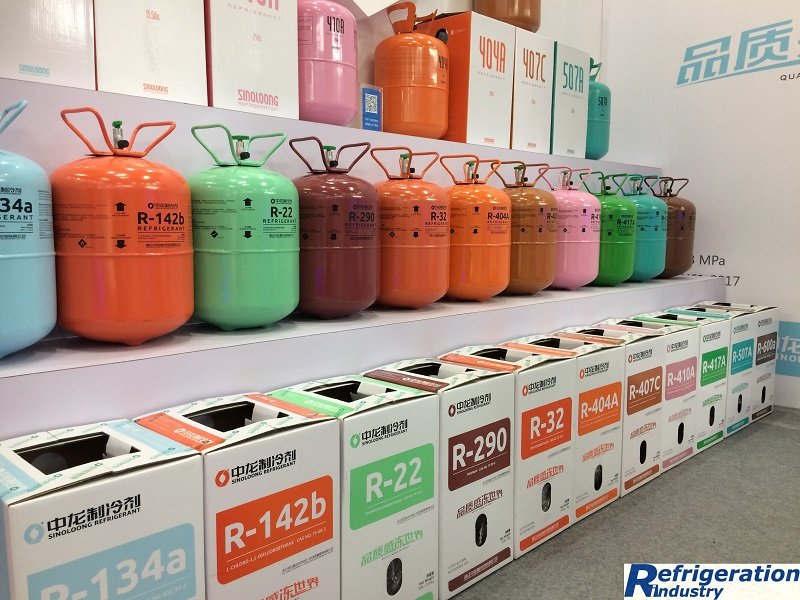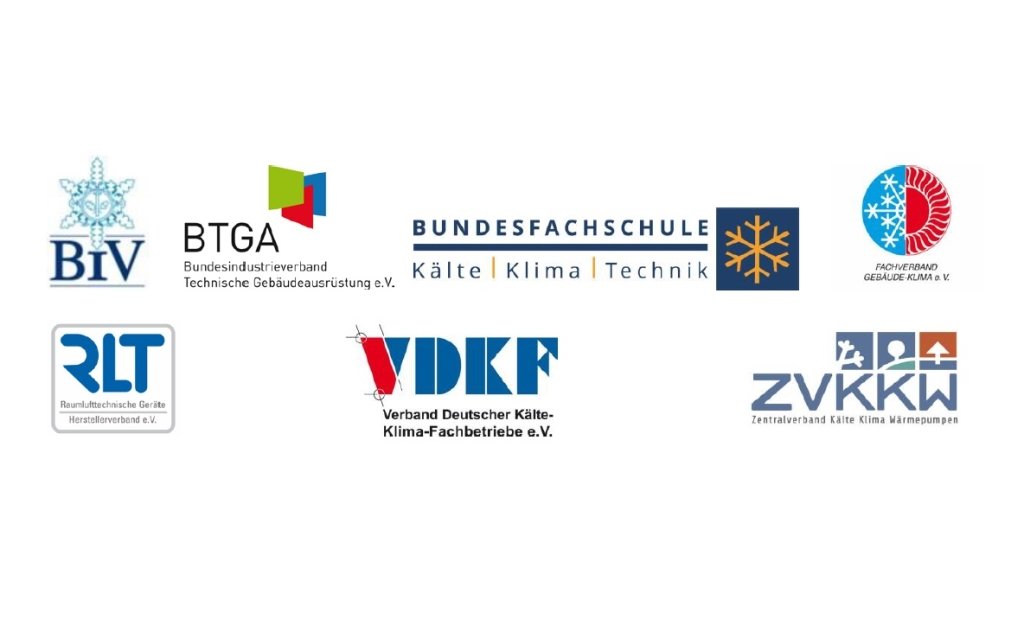The organisations BIV, BTGA, Bundesfachschule, FGK, RLT-Herstellerverband, VDKF and ZVKKW have prepared a joint statement on the planned ban of the PFAS group of chemicals within the framework of the European REACH Regulation.


The above-mentioned organisations represent the entire value chain of the German refrigeration and air conditioning industry – trade, plant engineering, manufacturers and education.
We support the planned restriction of environmentally harmful PFAS chemicals under the European REACH-regulation wherever technically possible. The refrigeration, air conditioning and heat pump industry uses PFAS chemicals in many forms and applications – including in gaskets, construction and coating materials, electrotechnical components and as fluorinated refrigerants.
However, suitable alternatives with the same mandatory material properties are in many cases not currently available, nor can they be developed as market-ready products within the timeframe of the planned ban deadlines, if this is possible at all. We therefore reject the ban on all PFAS chemicals currently under consideration by the ECHA (European Chemicals Agency), provided it is detached from an assessment of the actual environmental impact and the foreseeable availability of suitable substitutes. The safe operation of refrigeration, air conditioning and heat pump systems would otherwise be massively jeopardised – with the corresponding consequences for our entire economy and society.
We support the planned restriction of environmentally harmful PFAS chemicals under the European REACH-regulation wherever technically possible. The refrigeration, air conditioning and heat pump industry uses PFAS chemicals in many forms and applications – including in gaskets, construction and coating materials, electrotechnical components and as fluorinated refrigerants.
However, suitable alternatives with the same mandatory material properties are in many cases not currently available, nor can they be developed as market-ready products within the timeframe of the planned ban deadlines, if this is possible at all. We therefore reject the ban on all PFAS chemicals currently under consideration by the ECHA (European Chemicals Agency), provided it is detached from an assessment of the actual environmental impact and the foreseeable availability of suitable substitutes. The safe operation of refrigeration, air conditioning and heat pump systems would otherwise be massively jeopardised – with the corresponding consequences for our entire economy and society.
Our core demands, justified below, are:
- Complete exemption for fluorinated refrigerants
- Temporally unlimited exemption for refrigerants containing PFAS for existing systems
- Temporally unlimited exemption for spare parts containing PFAS for existing systems.
In principle, we also question the legal conformity of the PFAS ban proposal in the context of a comitology procedure without the possible influence of the EU Parliament and Council.
Complete exemption for fluorinated refrigerants
With five exceptions, all fluorinated refrigerants belong to the group of PFAS chemicals and they would therefore be affected by the PFAS ban. Their use is already strictly regulated and continuously restricted under the European F-Gases Regulation because of their greenhouse effect. However, F-gases themselves do not have any harmful or toxic properties and are therefore rightly referred to as safety refrigerants and are even used as propellants in medical dosage sprays.
The focus of the PFAS ban with regard to refrigerants is on TFA (trifluoroacetic acid), the atmospheric degradation product of F-gases, and not the F-gases themselves. TFA accumulates in soils and waters and is considered to be non-degradable (persistent). However, the UNEP Assessment Report (United Nations environment programme) published in 2022, taking into account and after evaluating all international studies from the last four years, proves that a ban on TFA is not scientifically justifiable due to its low environmental risk and recommends an exemption for this group of chemicals, which we fully endorse.
Quotes from the UNEP report clearly prove this:
- "TFA does not interact with biological molecules and due to its high solubility in water, bioaccumulation does not occur. It is unlikely to have adverse effects on terrestrial and aquatic organisms."
- "We believe that persistence should only be considered as a regulatory criterion for substances that are moderately or highly toxic and/or bioaccumulative in organisms. TFA does not accumulate and is not toxic even at the low to moderate exposures currently measured in the environment or predicted in the distant future."
- "The increase in TFA concentrations is not expected to pose a significant risk to humans or the environment at this time. Based on the projected future use of these precursors (refrigerants) of TFA, no harm is expected."
- "TFA has biological properties that are significantly different from the longer-chain PFASs and the inclusion of TFA in this larger group of chemicals to be regulated would be inconsistent with the risk assessment of TFA."
The UNEP report also shows that there are natural sources of TFA and that the TFA concentrations measured in the environment can only be attributed to a small extent to F-gas emissions. They are many times higher than could have been caused by F-gases alone. Even if all F-gases produced since 1990 had entered the environment completely as TFA, there is a high discrepancy with the TFA concentrations measured in the oceans.
However, the theoretical total amount of TFA that could be explained due to anthropogenic activity in relation to the use of F-gases is far from the actual amount produced by direct F-gas emissions, as the majority of F-gases are not emitted in the EU. Refrigeration, air conditioning and heat pump systems are technically tight systems, which is of utmost importance in practice – on the one hand for environmental reasons and on the other hand because unwanted F-gas emissions lead to a reduction in performance and especially also in efficiency. Therefore, regular checks are carried out to prevent emissions. During maintenance and service work, as well as when refrigeration and air conditioning systems are taken out of service, F-gases are properly extracted and recycled.
The leakage rate of stationary refrigeration and air conditioning systems is extremely low, as an evaluation of the industry software "VDKF LEC" used in Germany shows. The software records refrigerant data from over 238,000 systems at more than 54,000 operators. The average leakage rate across all application areas was only 1.12 % in 2022. This value has continuously decreased by 65 % from 2017 to 2022.
Direct F-gas emissions will also continue to fall in the coming years due to the increasing use of non-fluorinated refrigerants. The EU F-Gas Regulation, which is currently being amended, further restricts the total quantity and possible uses of F-gases and expands the restrictions and bans on use to include additional F-gases (HFO). Therefore, PFAS and TFA exposures from fluorinated refrigerants are expected to continue to decrease. The assessment of the environmental impact of TFA or F-gases must therefore be subjected to a renewed review by ECHA, which should conclude that a complete exemption is made for PFAS-containing F-gases.
Indefinite exemption for service and maintenance with F-gases
Independently of a complete exemption of F-gases from the PFAS ban, we call for an indefinite exemption for fluorinated refrigerants for service and maintenance purposes.There are tens of millions of refrigeration, air conditioning and heat pump systems in operation in the EU. Their number will increase significantly in the coming years until the possible entry into force of the PFAS ban due to the growing demand for air conditioning and the planned expansion of heat pumps. The majority (at least 90 %) of the existing systems and also a large proportion of the new systems to be installed in the next few years use F-gases as refrigerants. The service life of the systems is 20 years on average; however, many systems are in operation for much longer. Currently, the PFAS ban proposal only provides for a time exemption for service and maintenance with F-gases of existing systems of 13.5 years. However, service and maintenance must be ensured for the entire lifetime of the plants. On the one hand, the safe and continuous operation of refrigeration, air conditioning and heat pump systems is mandatory in almost all applications (data centre, hospital, blood bank, supermarket, etc.). It must therefore be ensured that immediate repair is possible even in the event of sudden refrigerant leaks.
On the other hand, it is not possible to convert systems with F-gases to non-fluorinated refrigerants. Complete new installation with associated high investments would be necessary. This affects all companies where refrigeration and air conditioning systems are used and also private customers who have installed heat pumps with F-gases or will do so in the next few years. Replacement before the end of the systems' service life represents an unacceptable financial burden for all operators. Especially in system-critical applications, a new installation must also be planned for the long term and cannot and must not become necessary at short notice in the event of a repair due to the unavailability of the refrigerant. Depending on the size of the system, months can pass before a new refrigeration or air conditioning system is installed. During this time, the downstream processes that are absolutely dependent on the refrigeration systems would be massively affected, which would result in production downtimes, damage to goods and warehouses, server downtimes, etc. As a result, many operators would be forced to replace their systems as a precaution due to the unavailability of refrigerants, as they cannot take the risk of having to manage without cooling or air conditioning for an extended period of time. All these investments and risks pose a great danger to the business location.
Indefinite exemption for spare parts in refrigeration, air conditioning and heat pump systems
Numerous components in refrigeration, air-conditioning and heat pump systems contain PFASs – seals, bearings, sensors, etc. Above all, the coatings and sealing materials used serve to maintain function, interchangeability and ease of maintenance and to prevent environmentally harmful substance releases. Their material properties are specially designed for the refrigerant used in the systems. Substitution with other materials is therefore not possible. Approvals would lose their validity and there would be a danger for the environment as well as for employees of the operators and specialists who are entrusted with maintenance and service of the systems if the leakage of refrigerant (flammable/toxic/greenhouse-effective) can no longer be prevented 100 % reliably by inferior seals.A single component that is no longer available on the market due to the PFAS ban (e.g. a simple sealing ring) would possibly result in the replacement of a complete refrigeration, air conditioning or heat pump system. In this context, the same argumentation applies as for the exemption regulation for refrigerants for service as mentioned above (unreasonable financial burden for operators as well as ensuring uninterrupted operation, especially for system-critical applications). We therefore call for a time-unlimited exemption for the use of spare parts containing PFAS in existing systems.
PFAS ban project not compliant with EU law
Apart from the technical and substantive arguments listed above, we believe that the PFAS ban proposal does not comply with EU law. The restriction of PFASs according to the REACH Regulation is to be carried out within the framework of a comitology procedure by the EU Commission without any possible influence by the EU Parliament and Council. Comitology procedures are basically used for non-essential adjustments of regulations. However, numerous aspects of the PFAS restriction argue against this being a non-essential adaptation. The scope of substances regulated by this restriction measure, as well as the regulated uses, is unprecedented in the history of EU regulatory projects. The economic and societal impact of the PFAS ban is so immense that it will have to be negotiated politically, for which the ordinary legislative procedure is essentially foreseen in the EU.